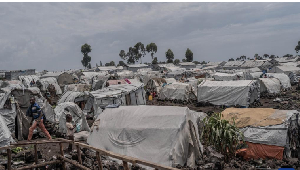- Home - News
- TWI News | TV
- Polls
- Year In Review
- News Archive
- Crime & Punishment
- Politics
- Regional
- Editorial
- Health
- Ghanaians Abroad
- Tabloid
- Africa
- Religion
- Election 2020
- Coronavirus
- News Videos | TV
- Photo Archives
- News Headlines
- Press Release
Opinions of Sunday, 30 May 2010
Columnist: Boakye, Dominic Osei
Is Rural Development significant for Ghana's Economy?
Rural Areas cover a greater portion of the country’s land area and well as function as home for majority of Ghanaians. It is also these areas that face seemingly intractable socio-economic challenges. Some of our farming and forestry businesses still need to build their competitiveness in both local and international front. More generally, average income per head is lower in rural regions than in our towns and cities, while the skills base is narrow and the service sector is less developed.
Efforts made to develop the Rural Areas in Ghana Ghana’s effort towards rural development dates back to 1943 when the idea to establish the Department of Social Welfare and Community Development was first considered. With the creation of the Department of Social Welfare and Housing in 1946, most of its effort was concentrated on the construction of community centers, social clubs and youth centers as the basis of welfare work. The main strategy for rural development at that time was the community development approach. Under this approach the major target was to help the rural folk grow in civic responsibilities and in use of their potentialities and talents in achieving desirable economic and socio-cultural goals. The main objective was to stimulate the local populace to undertake self-help projects to improve their living standard.
Aside that many other approaches were employed to help attain rural developments. And such are the social amenity approach, the increased agricultural approach, accelerated project approach and Regional Development and growth pole Strategy which were ineffective hence failed due to the following reasons:
* Its expensiveness to run due to the rural areas demand for a wide range of substantial social services, whereas the financial, manpower and organizational resource for effective delivery of social services are often extremely limited. *Also, the rising cost of living, high prices of foodstuffs and under-utilization of the productive capacity of severe agro-industries in the country are all indicative of the fact that the Increased Agricultural Production approach could not make a significant impact on the Ghanaian consumer. *Again, an approach such as the Accelerated Project Implementation approach failed as result of the Regional Planning Committees’ inability to serve as a link between regions and the central planning agencies in Accra in matters of economic development. The lack of sufficient authority and a prudent budget to deal with local development issues, which transcended sectoral decision accounted for the demise of the strategy. The mandate given them was weak and blurred. They had neither legal status nor a significant budget.
*Lastly, an approach such as the Regional and Growth Pole Strategy appeared feasible on paper but was full of problems with implementation. The lack of personnel at the region, districts and local areas in effect affected community participation in the formulation and implementation of rural development projects.
However, the rural development approaches employed by the various successive governments serves as evidence for the country’s persisting effort to develop its rural areas. A critical analysis of the rural development approaches employed in the country reveals that, limited financial, manpower and organizational resources made the dream of the country’s attainment of rural development unachievable. That is with the presence of the above listed resources the rural development approaches, employed earlier when revisited, will help in the attainment of the country’s long desired rural development. Impacts of Rural Development on the Economy
The International Fund for Agriculture Development estimates that about 51 per cent of the poor people in Ghana live in rural areas and that poor rural people have limited access to basic social services, safe water, all-year roads, electricity and telephone services. It is against this backdrop that development interventions in the rural areas are very urgent and crucial. It goes without saying that the country would make no headway if the rural setting is neglected. Improve the quality of life in rural areas and encouraging diversification of the rural economy: Development in the rural areas means that the standard of living of the populace will increase. Also, there is the likelihood that activities in the area will divert from Primary to Secondary and tertiary. Improve the environment: The country’s rural areas have a great deal to offer. It gives us essential raw materials alright but as side that its value as a place of beauty, rest and recreation – when we look after it – is self-evident. That is rural areas when taken care of can continuously serve as the country’s lungs, and for that matter a battleground for the fight against climate change. Safeguards for the rural sector: Since agriculture is the major activity of the rural area a development there means there would be the presence of development of plans, veterinary infrastructure and skilled staff to build capacity for early detection and control of and response to livestock and crop diseases. Of particular concern are those livestock diseases that can be transmitted from animals to humans. And aside from that there would be food security in the country.
Development in the rural areas can also help improve the competitiveness of the agricultural and forestry sector.
In conclusion, Ghana being a developing economy can obviously have a great demand for resources especially financial resource which is limited. And this for that matter explains why our satisfaction level to some project and policies are low. However, for Ghana to entirely or relatively meet demand for these resources, there is the need to create reliable means of generating resources especially financial resource; a role which petroleum resource or any other natural resource exploited in the country cannot play but rather a developed rural area. This is because petroleum and other exploited natural resources as non-renewable resources as they are would with time be exhausted. That is, Ghana should make hay while the sun shines. So now that we have petroleum and other renewable resources, it should be the country’s priority to invest in the rural development for a lasting economic boost.
The author, Dominic Osei Boakye is at the Department of Economics, Kwame Nkrumah University of Science and Technology, Kumasi-Ghana. (Email: romeoston@yahoo.com.au)
Opinions









